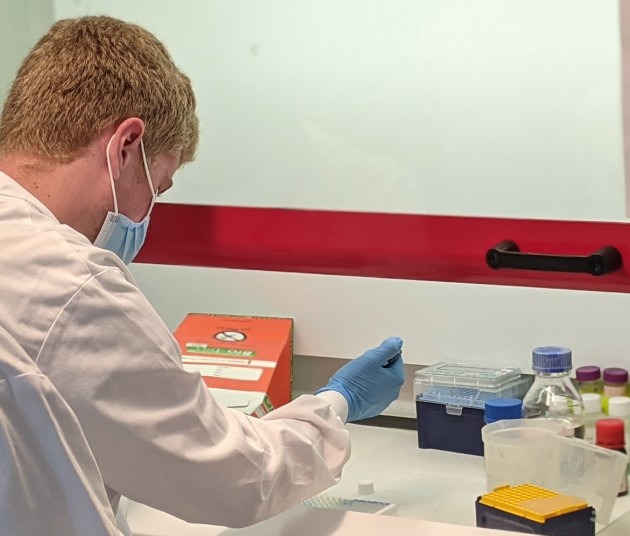Key Information
Start Date:
Monday 22 September 2025
Campus:
Course Spaces:
10 places for non-Imperial students
Introduction
The BSc Medical Sciences with Cancer Frontiers programme focusses on the mechanisms associated with cancer development and progression and how these can be targeted to improve patient outcomes. The course will give you a grounding in the essentials of cancer studies, supported by e-Modules and blended learning, and will introduce you to the cutting-edge technologies that are being used to detect, characterise and treat cancer. Many of these technologies are being pioneered at Imperial, so you will have the opportunity to be taught by and to discuss them with some of the leaders in the field.
The programme has a strong emphasis on research – we aim to provide you with the tools to interpret and inform best practice, and to extend the boundaries of current thinking in medicine. We also provide you with a strong foundation in scientific methodology and analytical approaches to give you the confidence to carry out postgraduate research studies, if you so choose. Importantly, even if you are unsure if cancer is your main interest, you can be assured that many of the topics that we cover in the course are highly relevant to other areas of medicine.
Course Dates and Structure
The programme is comprised of three modules. Module 1 is a 12-week teaching block where students gain specialism-specific knowledge and skills, alongside their core research training. Module 2 involves self-directed learning, including a group literature review and clinical case study. In Module 3 students undertake a 14-week research project.
The Cancer Frontiers term dates can be found in the 2024-25 iBSc Term dates
Programme Structure
Module 1
Module 1 - The Taught Module
In this 12-week teaching block you will receive interactive, engaging teaching sessions from leading experts in the fields of cancer research and associated disciplines. The topics covered include:
and associated disciplines. The topics covered include:
- The Hallmarks of Cancer
- Cancer models – 3D, animal models and patient avatars
- Cancer and the immune system - viruses, vaccines and immunotherapy
- Precision medicine – understanding and applying ‘omics and informatics
- Frontiers in imaging and bioengineering
- Advances in surgery, treatments and trials
Module 1 Assessment
Module 1 is assessed via three pieces of in-course assessment which account for 30% of the overall BSc mark:
Written Task (15% of Module 1)
Students will write a 1,000-word 'Critic at Large' article which will address a topical or controversial area of scientific research.
Oral Task (15% of Module 1)
Students will give a 10-minute poster presentation critically evaluating an area of cancer research followed by questions from assessors.
Data Management and Interpretation (70% of Module 1)
Students will undertake laboratory research, analyse and interpret the data and then write a results compendium, together with a scientific abstract and a lay summary.
How is this Module Taught?
Module 1 provides a blend of face-to-face teaching on campus, lab work, group work and online teaching. We aim to make our teaching as interactive as possible to promote student enagement with the content and cohort building.
The Module includes three consolidation weeks without teaching, where students can work on assessments, associated self-directed learning, on-line modules and group work. The consolidation weeks will also provide an opportunity to meet with the Course Lead to discuss progress, issues and receive feedback on coursework and progress.
Module 2
Module 2 - Self-Directed Learning
 Module 2 is a 4-week block which provides students with a collaborative experience of working with their peers to produce a critical synthesis of a scientific problem. Students will also work independently on a clinical case study involving a real patient, where they will investigate the science underpinning the patient's diagnosis and treatment.
Module 2 is a 4-week block which provides students with a collaborative experience of working with their peers to produce a critical synthesis of a scientific problem. Students will also work independently on a clinical case study involving a real patient, where they will investigate the science underpinning the patient's diagnosis and treatment.
Module 2 Assessment
Module 2 is assessed via two pieces of in-course assessment which account for 25% of the overall BSc mark:
Group Literature Review (25% of Module 2)
Students will work in groups of 4-5 to develop their team working, communication, critical appraisal and clinical translation skills through a literature review assignment that focusses on translation of basic understanding of cancer into patient-orientated research.
This assignment is submitted in 3 stages and is designed to mirror the process of submitting research to a scientific journal:
- Each group will produce a 3,500-word critical summary of a cutting-edge area of cancer research
- They will then produce a 1,000-word review of another group's critical summary
- Finally, groups will produce a revised critical summary addressing the peer referee group’s comments
Science in Context (10% of Module 2)
Students will be provided with a clinical case that forms the basis for an in-depth scientific exploration of the current and emerging evidence for either the underlying cause of the disorder or current treatment options. Students will be assessed via a scientific poster and poster presentation.
How is this Module Taught?
Module 2 is self-directed learning so there are guidance sessions but no taught sessions. For both pieces of Module 2 assessment, all students will be supported by an academic supervisor who is an expert in the field of study.
Module 3
Module 3 - Research Project
 In Module 3 students will conduct a 14-week supervised research project resulting in a project write-up in the style of an academic research paper. Students will have the opportunity for critical reflection on the design of research, validation of approach, and robustness of data interpretation.
In Module 3 students will conduct a 14-week supervised research project resulting in a project write-up in the style of an academic research paper. Students will have the opportunity for critical reflection on the design of research, validation of approach, and robustness of data interpretation.
Students will choose from a range of current and topical research projects. Examples of past projects include:
Clinical Projects
- The systemic inflammatory reaction as a predictive biomarker of response to immunotherapy
- The association of smoking and vaping with ovarian cancer risk in the Cancer Loyalty Card Study
- Screening for Hepatocellular Carcinoma via Breath Analysis of Exhaled Volatile Organic Compounds
Laboratory Projects
- Light-driven generation of reactive oxygen species as a research tool for oxidative stress
- Molecular profiling of gut microbiota as a biomarker of response to checkpoint inhibitors
- Generating CRISPR/Cas9-derived models of ovarian high grade serous carcinoma
Module 3 Assessment
Module 3 is assessed via two pieces of in-course assessment which account for 45% of the overall BSc mark:
Project Report (78% of Module 3)
Students will produce a 5,000-word project report.
Oral Presentation of Project (22% of Module 3)
Students will give a 10-minute oral presentation reflecting on their individual research journey and future research directions, followed by 5-minutes of questions.
How is this Module Taught?
All students will have a dedicated project supervisor who will be a senior academic at Imperial. The supervisor will guide support the student throughout their research journey.
Additional support will be provided by the Module Lead, who will run regular project support sessions. Students will give a project progress presentation with their BSc Cancer Frontiers cohort at regular intervals.
Meet the Team
Dr Robert Kypta
/prod01/channel_3/media/migration/faculty-of-medicine/robert-kypta_1639436665388_x4.jpg)
Dr Robert Kypta
Course Director
Emma Richardson
/prod01/channel_3/media/images/people-list/Emma-Richardson-portrait.jpg)
Emma Richardson
Course Administrator
Dr Joana dos Santos
/prod01/channel_3/media/migration/faculty-of-medicine/joana_1639489431936_x4.jpg)
Dr Joana dos Santos
Course Teaching Fellow
Professor Sadaf Ghaem-Maghami
/prod01/channel_3/media/migration/faculty-of-medicine/sadaf-ghaem-maghami_1639436925402_x4.jpg)
Professor Sadaf Ghaem-Maghami
Module 1 Lead
Dr Olivier E. Pardo

Dr Olivier E. Pardo
Module 1 Assessment Lead
Mr Duncan Spalding
/prod01/channel_3/media/migration/faculty-of-medicine/duncan-spalding_1639437009750_x4.jpg)
Mr Duncan Spalding
Module 2 Lead
Dr Jonathan Krell
/prod01/channel_3/media/migration/faculty-of-medicine/jonathan-krell_1642942379436_x4.jpg)
Dr Jonathan Krell
Module 2 Lead
Dr Rohini Sharma
/prod01/channel_3/media/migration/faculty-of-medicine/rohini-sharma_1639437289654_x4.jpg)
Dr Rohini Sharma
Module 3 Lead
Student Support

We know that joining a new university can be daunting so we will do all we can to make you feel welcome at Imperial and help you to integrate within your cohort.
Our Imperial School of Medicine Student Union (ICSMSU) run fantastic welcome events for new intercalating students and the Cancer Frontiers Team will run activities to help support students in getting to know one another. We also run a BSc Buddy Scheme which you can join to be matched with internal Imperial students on your BSc or on one of our other iBScs.
Each student will also be assigned an Academic Tutor who can support on both academic and pastoral matters throughout the BSc. We have a wide range of student support provisions, systems and services designed to assist you throughout your studies. Please find further information in the Imperial Student Support Zone.
